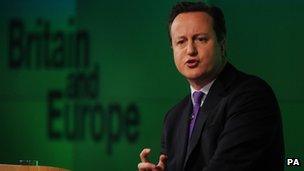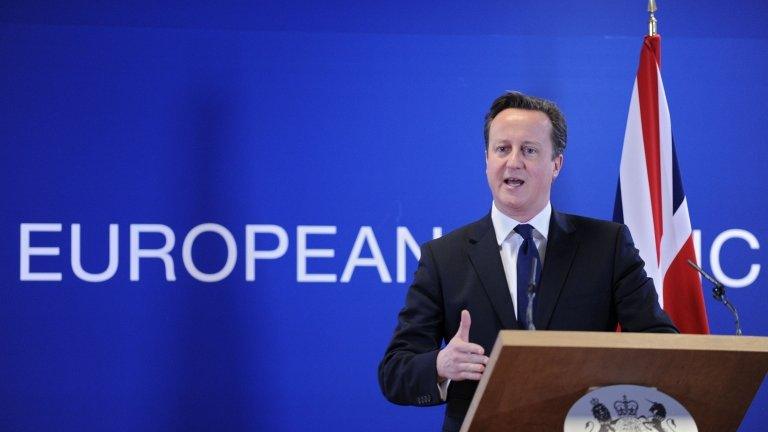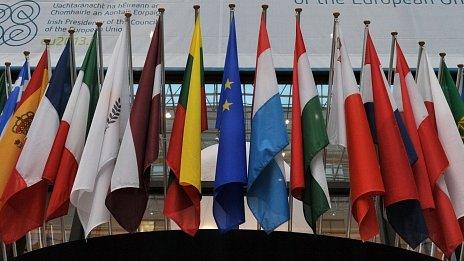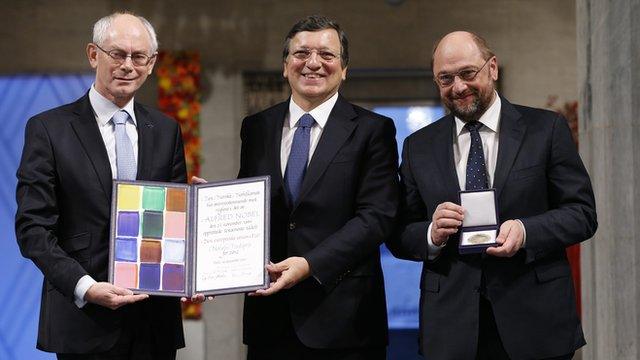Very different ideas about Europe
- Published
- comments

David Cameron's renegotiation could paralyse the EU, a German MP said
The popular German tabloid Bild asked today: "Is Britain destroying the EU?" The headline reflects the unease felt across Europe over David Cameron's promise to re-negotiate its EU membership.
Europe now knows what it long suspected: many in Britain have a completely different vision of the EU than those on the continent. David Cameron's European idea is of a flexible, pragmatic union that focuses on trade. The question he asks is: can the EU, as it is currently structured, deliver prosperity? In the rest of Europe they believe that closer integration will build the European dream.
Officials in Brussels said that Cameron was offering a "pick and mix Europe". His vision was for a Europe "a la carte", where countries chose what they liked and disliked.
The German Foreign Minister Guido Westerwelle said "cherry picking was not an option". There was a similar reaction from the French Foreign Minister Laurent Fabius. "We can't have Europe a la carte," he said. "Imagine the EU was a football club; once you've joined up and you're in this club you can't then say you want to play rugby."
As regards trying to repatriate powers to Westminster, the President of the European Parliament, Martin Schulz, said it would be a "drawn out and cumbersome negotiation" involving long and complex procedures. The head of the German European Affairs Committee Gunther Krichbaum said the "EU was not a multiple choice event". He compared re-negotiation to "opening Pandora's box".
No special case
The German foreign minister went out of his way to say that he hoped the UK would continue to play an "active" and "constructive" role in the EU. He offered a concession: he agreed that not everything decided in Brussels needed to remain at a European level. He signalled that Germany would support some regulations returning to the member states.
Here's the dilemma. There are several states which believe that some measures, currently operated at EU level, could be returned to national governments. Any adjustments, however, they insist must include all 27 members. There is little support for Britain being treated as a special case. The problem for David Cameron is that he is fighting for a complete overhaul of Britain's relationship with Europe, not a tinkering at the edges.
The question I heard asked time and again today was what would the prime minister do if he felt he wasn't winning enough concessions. Might he recommend leaving the EU if he didn't get a good deal? A German MP said he thought this negotiation risked "paralysing the EU for years". One German minister was asked about the risk of Britain blackmailing other states to win further opt-outs. He declined to answer. So there is great uncertainty as to what these next years will bring.
One other unknown. It is far from clear whether the German Chancellor, Angela Merkel, will push for a major revision of the treaties in 2015. If she doesn't, that will make Britain's task of re-negotiating far more difficult.
There are divided views in Europe about the referendum. One senior EU official said he welcomed Britain finally deciding whether it wanted to be in or out of Europe. "Let's settle it once and for all," he said. Others said a referendum was "highly risky". Voters might decide to punish the government by voting to leave the EU.
There were lots of statements about how much Europe needs the UK - but not at any price. Some officials welcomed David Cameron's positive remarks about the EU. However, ultimately David Cameron's vision for the EU - a flexible, adaptable union - is not widely shared.
The German foreign minister said: "We do not need less Europe but more integration."
Nothing said today can avoid the reality that Britain and much of the EU have very different ideas about the future of the union.
What is clear is that Britain will face a difficult and uphill battle if and when it starts to re-negotiate its membership.
- Published23 January 2013

- Published20 January 2013

- Published10 December 2012

- Published24 September 2015